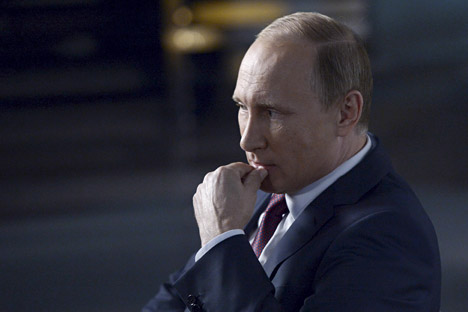
Russian President Vladimir Putin.
ReutersThe United States and its allies are continuing to build global missile defense systems whose real aim is to neutralize Russia's nuclear potential, Russian President Vladimir Putin stated during a meeting on the development of the defense industry on Nov. 10.
"We have said on many occasions that Russia will take the necessary steps to strengthen the potential of its strategic nuclear forces," said Putin.
Indeed, for the last several years, starting basically in 2001 (when the U.S. unilaterally abandoned the 1972 missile defense agreement), the Russian government has been talking about the necessity of developing Russia's strategic forces as a response to the deployment of American missile defense systems.
At the same time Moscow has always spoken about how it does not want an arms race and a full-scale confrontation with the West. In an exclusive interview with the Rossiyskaya Gazeta newspaper on Nov. 11 Prime Minister Dmitry Medvedev talked about the necessity of avoiding a military confrontation.
"The planet has been through two world wars. It is perfectly clear that something like this cannot be allowed to even pass through one's mind," he said.
According to experts, Putin's latest statements are unlikely to influence Russian-American relations, which are now at their most critical point since the end of the Cold War.
“Putin's words indicate a certain status quo and tells our partners that we will continue our chosen course [to maintain strategic parity with Washington],”said Vasily Belozyorov, director of the Association of Military Political Analysts.
According to Putin, in the last three years the Russian defense industry has built and successfully tested a series of potential weapons systems capable of proving combat solutions in conditions of the layered missile defense system.
Russian experts could not name the exact weapons that the Russian leader had been talking about, referring also to the secrecy of the current developments. However, they did mention the systems that have been adopted for military use in recent years that are capable of overcoming even the most sophisticated missile defense.
First, this is the RS-24 Yars ground-based intercontinental ballistic missile, which the Russian strategic missile forces are now actively adopting. Supposedly, in five years the Yars, which is able to penetrate both existing and potential missile defense systems, will become the foundation of the Russian ground-based nuclear group.
Unlike its predecessor the Topol-M, the Yars has three warheads, not one. Less vulnerable to antimissile systems, it accumulates speed quicker and its multiple warheads are capable of maneuvering in the final stage of flight.
The Bulava sea-based intercontinental ballistic missile could also be a solution for overcoming missile defense systems. The missile is capable of carrying 10 independently targetable hypersonic maneuverable nuclear blocks, which can change the height and direction of the flight trajectory. Despite unsuccessful first tests, the latest launches of the Bulava have been very effective.
According to independent military expert Konstantin Bogdanov, the Iskander-M operative-tactical system can also be used to defeat missile defense systems. Its missiles are equipped with nuclear warheads. The new winged Caliber missiles, whose potential was recently tested during launches from Russian ships in the Caspian Sea, are also an option.
Today Russia is also actively financing potential development in the field of nuclear deterrence. In the last several years Russia has been trying to create the new Sarmat heavy liquid-fuel missile, which in a few years should replace the R-36M missile, called Satana due to its destructive force.
During the Nov. 10 meeting on Russia's defense industry the TV cameras focused on a slide in the hands of a participant that contained the concept and the development period of the so-called Status-6 Oceanic Multifunctional System.
Bogdanov believes that this is a sort of missile-torpedo with a nuclear warhead that would be launched from a submarine. In his opinion, it is no coincidence that the mass media has gained knowledge of this project – the government has intentionally sought to demonstrate the existence of such developments.
Moreover, experts say that Russia's Strategic Rocket Forces and the development of new models are unlikely to suffer from the economic crisis, which has already led to Russia's GDP shrinking.
"Russia's nuclear forces are surely one of the priorities. Preserving strategic stability for the defense ministry and government is a definite objective," said Prokhor Trebin of the Russian International Affairs Council, who believes that Russia will always find the resources for such programs.
All rights reserved by Rossiyskaya Gazeta.
Subscribe
to our newsletter!
Get the week's best stories straight to your inbox